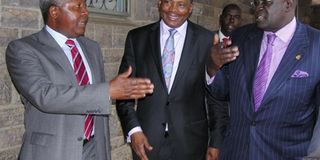Senators, MPs told to respect Judiciary

From left, Senate Deputy Speaker Kembi Gitura, National Assembly Speaker Justin Muturi and University of Nairobi Vice Chancellor George Magoha after a public debate on the separation of powers at the institution on July 28, 2014. PHOTO | SALATON NJAU | NATION
What you need to know:
- The public lecture was the first event of the Parliament Week and featured interesting debate on the principle of the separation of power
- Disputes between Parliament and the Judiciary have created confusion about the role of each arm
Parliament must submit to and respect the interpretation of the law by the Judiciary, university lecturers have said.
Speaking at the inaugural public lecture by Parliament’s leaders at the University of Nairobi, lecturers told National Assembly Speaker Justin Muturi and Senate Deputy Speaker Kembi Gitura that there need not be confusion about the roles of Parliament and the Judiciary.
The public lecture was the first event of a programme called Parliament Week and featured an interesting debate on the principle of the separation of powers, which has been one of the talking points of the Eleventh Parliament.
Disputes between Parliament and the Judiciary have created confusion about the role of each arm.
HARMFUL NOSTALGIA
It has also not helped Parliament that it seems to have nostalgia for the days when ministers were MPs, and the National Assembly has changed its rules to create time for Cabinet Secretaries to come and answer questions directly in the chamber.
“As long as you don’t respect the interpretation of laws by the Judiciary, the confusion will continue,” said Prof Edward Kisiangani, who teaches political science at Kenyatta University.
According to Prof Okoth Okombo, deliberate disobedience of the law, also known as impunity, is the biggest problem in Kenya and the source of disputes between the Judiciary and Parliament.
“We’re not saying that Members of Parliament can’t interpret the law, and indeed some of them are very good lawyers in their own right, it’s only that it is not their duty,” said Prof Okombo.
TEAM MANAGERS AND REFEREES
He employed a football analogy to explain the difference between the mandates of the Judiciary and Parliament, equating the Legislature to a team manager and the courts to a referee.
“The team manager must understand the rules, but the referee’s decision is final,” said Prof Okombo, a linguistics professor.
Political science lecturer Prof Maria Nzomo said the three arms need to work on the basis of mutual respect.
“You can actually exercise restraint in respect of the other arms of government,” said Prof Nzomo.
Mr Muturi and Mr Gitura argued that it was unfair to expect Parliament to have its work stopped by the Judiciary, which they said should only step in after laws have been passed or the Houses are finished with a matter.
“Nobody has the right to interfere. The moment the Judiciary tries to stop the National Assembly or the Senate from doing its work, that is interference,” said Mr Gitura.
WILL OF THE PEOPLE
He argued that if there was continued interference in Parliament’s work by the Judiciary, Kenya would go into a “Judiciary dictatorship.”
“If we cannot impeach a governor because of the Judiciary, then we will only impeach after they have given us guidelines,” said the Deputy Speaker.
“Parliament represents the will of the people and exercises their sovereignty. Parliament’s job is to legislate. Allow Parliament to do that and if there are any provisions or laws that are either unconstitutional or illegal, go to court and seek to know whether it complies with the Constitution,” said Mr Muturi.
Parliament has in the past one year had disputes with the Judiciary over the impeachment of the Embu governor by the Senate and in connection with the issue of the National Assembly's oversight over the Judiciary’s spending.
Although he was impeached by the Senate, Embu Governor Martin Wambora remains in office on the basis of a case he filed in court, which issued an order reinstating him pending the determination of the case.
SEPARATION OF POWERS
This has sparked a debate about where the powers of the three arms of the government begin and end.
To give scholars, students and the public an opportunity to discuss such matters and to know how the two Houses work, Parliament has organised Parliament Week, which started Monday and ends on Friday.
The programme features events and activities involving politicians and others and seeks to connect the public with parliamentary democracy in Kenya.
From the university, the legislators will head to the Nyayo National Stadium on Thursday, where scheduled football matches will take place between the National Assembly and the Senate.
An Open Day will be held on Friday, August 1, at Parliament’s public parking space, opposite Sheria House. The Open Day will feature exhibitions by the directorates, departments and causes in Parliament to explain what they do.
Parliament has also planned brief tours by the public to the National Assembly and Senate chambers and the galleries, subject to security clearance.





